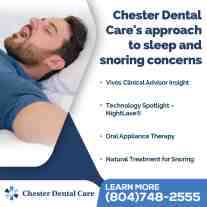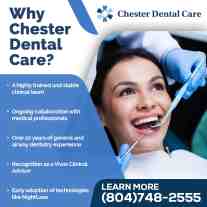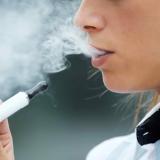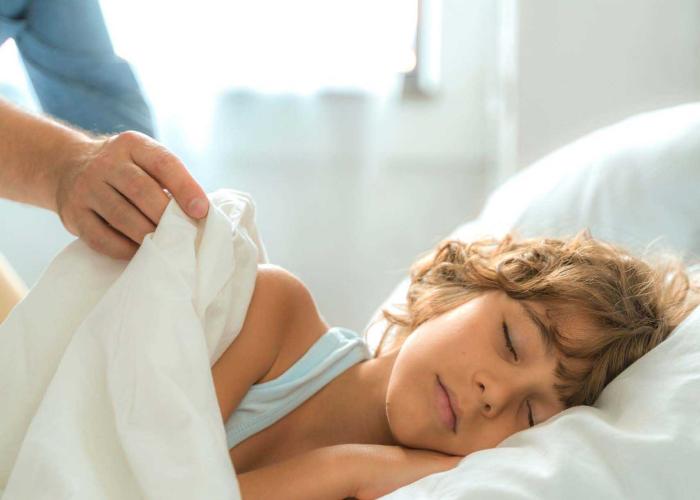Many adults in Chester, Virginia, live with untreated snoring or sleep apnea, unaware of the long-term health impact. While snoring may seem harmless, it can disrupt both the snorer’s and their partner’s rest, leading to chronic fatigue, irritability, and relationship stress. More concerning is the possibility that what appears to be snoring is actually obstructive sleep apnea—a condition linked to high blood pressure, cardiovascular disease, and increased accident risk due to daytime drowsiness. Distinguishing between these two sleep disruptions is critical for effective care.
The stakes are high, but the solutions are accessible. Snoring treatments range from behavioral changes and targeted snoring treatment exercises to advanced non-invasive therapies. For those seeking a natural treatment for snoring, Chester Dental Care offers structured programs that include sleep position coaching, weight management support, and exercises to strengthen the airway muscles. For more persistent issues, we offer therapies such as NightLase® and Vivos, which address the root cause without the need for surgery. Accurate diagnosis and timely treatment help prevent complications and improve sleep quality—for both the individual and their household.
Key Takeaways
Snoring and Sleep Apnea Are Different
Snoring is a noisy but harmless condition for most, while sleep apnea causes breathing pauses and poses serious health risks. Knowing the difference helps you choose the right snoring treatments or sleep apnea solutions.
1. Snoring Treatments Are Effective for Mild Cases
Lifestyle changes, snoring treatment exercises, and advanced options like NightLase® and Vivos can considerably reduce snoring and improve sleep quality, all without invasive procedures.
2. Sleep Apnea Requires Medical Attention
Sleep apnea can’t be ignored. Treatment options like Vivos and NightLase®, or custom oral appliances, address the root cause and protect you from serious health issues, such as high blood pressure or heart disease.
3. Snoring Treatments Start with Simple Steps
At Chester Dental Care, we guide patients through simple, effective snoring treatments like weight management, sleep position changes, and throat exercises before recommending more advanced options.
4. Better Sleep is Within Reach
Whether you need snoring treatments or sleep apnea solutions, personalized care from Chester Dental Care makes sure that you get the right fix for a healthier, more restful night.
What Is Snoring?
Snoring is caused by a partial obstruction of the airway. This happens when the soft tissues at the back of your throat relax and vibrate as air passes through. Snoring is a common occurrence, often linked to lifestyle factors like weight, alcohol use, and sleep position.
According to studies, snoring affects about 90 million Americans, and 37 million are habitual snorers (Source: https://pmc.ncbi.nlm.nih.gov/articles/PMC6692255/). While snoring itself isn't usually dangerous, it can be disruptive. It may interfere with your sleep quality, leading to daytime fatigue and irritability. If left unaddressed, snoring can lead to more serious issues over time.
At Chester Dental Care, we offer sleep dentistry solutions, snoring treatment exercises, and lifestyle recommendations to help reduce or eliminate snoring. In some cases, more advanced treatments like NightLase® or Vivos may be necessary for persistent snoring.

What Is Sleep Apnea?
Sleep apnea is a more serious condition that causes breathing to stop temporarily during sleep. These pauses in breathing, often lasting 10 seconds or longer, can occur hundreds of times a night, leading to poor sleep quality and oxygen deprivation.
There are two main types of sleep apnea:
Obstructive sleep apnea (OSA) occurs when the muscles in the throat relax too much, blocking the airway.
Central sleep apnea happens when the brain fails to send signals to the muscles that control breathing.
Sleep apnea is associated with several health risks, including high blood pressure, heart disease, and stroke. The condition can also cause severe daytime fatigue, difficulty concentrating, and irritability.
Key Differences Between Snoring and Sleep Apnea
Snoring is typically less serious than sleep apnea. While both involve noisy breathing during sleep, the two conditions differ greatly in terms of severity and potential health risks.
Here’s a deeper look at the key differences:
1. Cause of the Condition
Snoring: Snoring occurs when the air passing through the nose and throat causes the tissues in the throat to vibrate. This vibration produces the sound of snoring. It can happen when the airway is partially blocked, often by relaxed tissues. Snoring is generally caused by factors such as sleep position, alcohol consumption, nasal congestion, or even obesity.
Sleep Apnea: Sleep apnea is a more severe condition. It happens when your airway becomes completely blocked or collapsed, leading to pauses in breathing. These pauses, called apneas, can last for 10 seconds or more. This condition is caused by a physical obstruction (in obstructive sleep apnea) or a failure in the brain's signaling (in central sleep apnea). It leads to a drop in oxygen levels in the blood, which can have significant health consequences.
2. Impact on Breathing
Snoring: Snoring doesn’t stop airflow; rather, it’s the sound produced by partially obstructed airflow. While it can be loud and disruptive, it generally doesn’t stop the person from breathing. The person can still get enough oxygen during sleep, although their quality of sleep may be impacted.
Sleep Apnea: In sleep apnea, the airway becomes blocked, causing complete or near-complete stops in breathing. These breathing pauses, which can occur hundreds of times a night, considerably disrupt sleep. The lack of airflow can lead to oxygen deprivation, which strains the cardiovascular system and may contribute to serious health issues like high blood pressure, heart disease, stroke, and even an increased risk of diabetes.
3. Duration of the Problem
Snoring: Snoring tends to be a continuous problem. If someone snores, they are likely to do so consistently every night, but the intensity may vary depending on external factors such as weight, position, alcohol consumption, or even the season (allergies can also affect snoring).
Sleep Apnea: Sleep apnea is a condition that typically worsens over time. It’s progressive, and without intervention, the number of apneas (breathing stoppages) can increase. Over time, the condition can have serious consequences on health and well-being.
4. Health Risks
Snoring: While snoring may not be directly harmful to your health, it can be a sign of an underlying issue, such as nasal congestion or obesity. Chronic snoring can also disrupt your sleep quality, leading to fatigue and irritability during the day. If the snoring is severe, it can also affect your bed partner's sleep.
Sleep Apnea: Sleep apnea poses significant health risks. The intermittent drops in oxygen levels and frequent awakenings can severely affect heart health, cognitive function, and overall quality of life. If untreated, sleep apnea can contribute to high blood pressure, heart disease, stroke, and diabetes, and even increase the risk of fatal accidents due to daytime sleepiness.
5. Symptoms Beyond the Noise
Snoring: The primary symptom of snoring is the sound itself. If you're a chronic snorer, you may experience daytime fatigue and dry mouth, but you typically don’t have additional symptoms like gasping for air or choking at night.
Sleep Apnea: Symptoms of sleep apnea go beyond just snoring. In addition to loud snoring, people with sleep apnea often experience:
Gasping or choking during sleep
Frequent nighttime awakenings
Excessive daytime fatigue
Morning headaches
Difficulty concentrating
Irritability and mood swings
Dry mouth or sore throat upon waking
6. Treatment Approaches
Snoring Treatment Options: Treatments for snoring vary depending on the cause. The simplest solutions include lifestyle changes (snoring treatments at home), such as losing weight, sleeping on your side, and avoiding alcohol before bed. In some cases, using nasal strips or other devices to keep the airway open can help. For persistent snoring, treatments like Vivos or NightLase® may be recommended to improve airway function.
Sleep Apnea Treatments: Treatment for sleep apnea often requires more intensive interventions. For milder cases, oral appliances that reposition the jaw can also be effective. In some cases, surgery may be necessary if other treatments are not effective.
7. Diagnosis
Snoring: Snoring is generally diagnosed based on symptoms reported by the person who snores or their bed partner. It is often self-diagnosed, though a visit to a healthcare professional can help determine the severity and any underlying causes.
Sleep Apnea: Diagnosis of sleep apnea requires a more in-depth evaluation. This usually involves a sleep study, which can be conducted in a sleep lab or at home using a portable device. During the study, your breathing patterns, oxygen levels, and sleep stages are monitored to assess whether sleep apnea is present.
Why Is It Important to Distinguish Between Snoring and Sleep Apnea?
An estimated 22 million Americans have sleep apnea—and up to 80% remain undiagnosed. (Source: https://www.lansingstatejournal.com/story/sponsor-story/mclaren-greater-lansing/2019/02/07/estimated-22-million-americans-suffer-sleep-apnea/2766933002/#:~:text=It%20is%20estimated%20that%2022,breathing%20while%20they're%20asleep) It’s essential to differentiate snoring from sleep apnea because they have different levels of health impact and require distinct treatments. If you’re simply snoring, lifestyle changes and snoring treatments may be enough to resolve the issue. However, if sleep apnea is suspected, immediate medical intervention is necessary to prevent severe long-term consequences.
Chester Dental Care is experienced in both general dentistry and sleep dentistry. We’re committed to helping our patients get the right diagnosis and treatment. If you or your partner is experiencing snoring or symptoms of sleep apnea, don’t wait. Let us guide you toward a better night’s sleep with the appropriate treatment options, including Vivos or NightLase® therapy, oral appliances, and referrals to sleep specialists as needed.
Understanding these key differences and acting quickly can help you avoid potential health risks and improve your quality of life.
Treatments for Snoring
Several treatments can help reduce or eliminate snoring. The right treatment depends on the underlying cause. Below are some options that may be effective:
1. Lifestyle Changes
Snoring treatment at home and small habit changes can help reduce nighttime snoring:
Losing weight can alleviate excess tissue around the throat that contributes to snoring.
Avoiding alcohol before bed can prevent throat muscles from relaxing too much.
Sleeping on your side may help keep your airway open and reduce snoring.
2. Snoring Treatment Exercises
Snoring treatment exercises focus on strengthening the muscles in the throat and soft palate to prevent airway collapse during sleep. These exercises may help improve muscle tone, reducing snoring over time.
At Chester Dental Care, we provide guidance on these exercises to help you achieve better results.
3. NightLase® Treatment
NightLase® is a laser treatment that can tighten throat tissues and reduce snoring. This non-invasive procedure helps to reduce airway collapse by stimulating collagen production. NightLase® can offer lasting relief for many patients who struggle with persistent snoring.
4. Vivos Treatment
Vivos is a custom dental appliance designed to help with snoring and mild sleep apnea. It works by gently repositioning the jaw, which opens up the airway for improved airflow during sleep. Over time, this device can improve both snoring and sleep apnea symptoms.
How to Treat Sleep Apnea
Sleep apnea requires more focused treatment due to its potential health risks. Here are some options:
1. Mild to moderate sleep apnea can be improved with Vivos treatment.
How does it work?
The device gently expands the upper jaw and airway over time. This structural change may reduce or eliminate the airway obstruction that causes obstructive sleep apnea (OSA).
Who can benefit?
Adults with mild to moderate OSA
Patients who can’t tolerate CPAP
Children with airway development issues
2. Oral Appliances
For mild to moderate sleep apnea, oral appliances can help reposition the jaw and tongue to prevent airway obstruction. These devices are comfortable and discreet, offering an alternative to CPAP for patients who struggle with wearing masks.
At Chester Dental Care, we can help create a custom oral appliance to address your sleep apnea symptoms.
3. Surgery
In rare cases, surgery may be necessary to remove excess tissue from the throat or to reposition the jaw. This option is typically reserved for severe cases of sleep apnea that don’t respond to other treatments.
Sleep Apnea Diagnosis and Next Steps
If you suspect you have sleep apnea, it's essential to seek professional evaluation. A sleep study is often used to diagnose the condition. This test monitors your breathing, oxygen levels, and brain activity during sleep, helping to detect and assess the severity of sleep apnea.
At Chester Dental Care, we can help you understand your snoring treatment options and more, and refer you to a sleep specialist if needed.

Frequently Asked Questions
1. What types of snoring treatments do we offer at Chester Dental Care?
We provide oral appliance therapy and airway-focused dental solutions as part of our snoring treatments at Chester Dental Care. These are non-invasive, custom-fitted devices designed to improve airflow and reduce nighttime obstruction.
2. How do I know if snoring treatments at Chester Dental Care are right for me?
If you snore frequently, wake up tired, or have been told you stop breathing at night, our snoring treatments at Chester Dental Care may help. We perform airway assessments to determine the best approach for you.
3. Are our snoring treatments at Chester Dental Care covered by insurance?
Some of our snoring treatments at Chester Dental Care may be covered by medical insurance, especially if related to sleep apnea. We help patients verify coverage and discuss options before starting treatment.
4. How do our snoring treatments differ from store-bought devices?
Our snoring treatments at Chester Dental Care are custom-fit to your unique anatomy and based on your airway health. Unlike over-the-counter options, we use medical imaging and dental scans to guide treatment.
5. Can snoring treatments at Chester Dental Care help with sleep apnea?
Yes, many of our snoring treatments at Chester Dental Care also address mild to moderate obstructive sleep apnea. We collaborate with sleep physicians to support long-term outcomes through oral appliance therapy.
Conclusion
Whether it’s snoring or sleep apnea, getting to the root of your sleep issues can improve your health and energy. At Chester Dental Care, we offer personalized snoring treatments and sleep apnea solutions tailored to your unique needs.
Our approach includes everything from lifestyle guidance to advanced dental therapies like Vivos, which can help improve airway structure over time. If you're dealing with snoring or think you may have sleep apnea, schedule a visit with us. Let’s help you take the next step toward better sleep and a healthier life.
Call us at (804) 748-2555
Email: frontdesk@chesterdentalcareva.com
We’re here to answer your questions and get you started.



